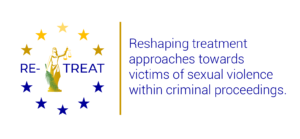 The Directive 2012/29/EU establishes the rule of an individual assessment for all victims of crime in all EU Member States (MS), considering personal characteristics of a victim and the nature and special characteristics of the crime, expressly mentioning sexual violence. However, victims of sexual crime are often re-victimised by justice systems that are not adapted to their rights and needs. Practitioners still lack capacity building and specialised training in dealing with victims of sexual crime.
The Directive 2012/29/EU establishes the rule of an individual assessment for all victims of crime in all EU Member States (MS), considering personal characteristics of a victim and the nature and special characteristics of the crime, expressly mentioning sexual violence. However, victims of sexual crime are often re-victimised by justice systems that are not adapted to their rights and needs. Practitioners still lack capacity building and specialised training in dealing with victims of sexual crime.
The overall aim of the RE-TREAT project is to boost procedural and organisational changes in the criminal proceedings within the justice systems in Spain, Italy and Greece in order to improve their responsiveness to particular needs of victims of sexual crimes. Thus, RE-TREAT will contribute to the call priority related to the victims’ rights by enhancing the practical implementation of the Directive 2012/29/EU.
Why the “Collection of Good Practices” is important during this specific historic moment?
There are many factors that reinforce the relevance of this research at this time.
One is its synergy with the Victims’ Directive 2012/29/EU. One of the Directive’s most important aims is to achieve a central place of the victim in the criminal justice system and improve their position. In doing so, a well-coordinated and tailored approach is required to meet the interests or needs of victims of crime. Special attention is drawn to the most vulnerable victims, including victims of sexual violence. To provide an individualised treatment for victims of sexual violence, it is important to consider different contexts of victimisation.

Prof. Dr. Antony Pemberton
The Leuven Institute of Criminology (LINC) has contributed to this understanding by conducting research in this area from different perspectives, going from the experiences of victims of sexual violence in conflict situations and institutional sexual violence such as the Catholic Church in Belgium to the justice interests of people who were sexually abused when young by another child from within their family circle. Prof. Dr. Antony Pemberton, involved in the RE-TREAT project and coordinator of the Research Line on Restorative Justice and Victimology at LINC, has also a wide-ranging insight into victimological perspectives on justice and played a key role in the development of the Directive as advisor for the EU.
Further, streamlining and identifying common criteria for action should help actors in the CJS to avoid re-victimisation and give victims certainty about what they can expect from these actors. A collection of good practices in the treatment of victims of sexual violence can achieve a shared understanding of how to respond to these victims in a respectful, sensitive and professional manner – taking the individual needs of the victim into account, as stated in article 1 of the Directive. Herewith, different approaches can be considered, both conventional and innovative responses. An example in the latter is restorative justice. LINC looked into the use of RJ in the context of sexual violence and identified promising possibilities in this field.
The Covid 19 crisis has focused our minds on how interconnected we are as individuals, communities and societies. We have come to better understand that we are all affected by things that might, at first glance, appear to not have a direct impact on us. The crisis is also reminding us that we all have a role and responsibility in the greater good. Sexual violence is a crisis in our society, for all members of society. Through this project we come together to find a collective way through that crisis.
How RE-TREAT’s research activities will change because of this emergency?
Due to the restrictions associated with the Covid 19 crisis, a number of changes had to be made to the data collection that will be carried out in the countries where the research will be piloted.
The aim now is to combine quantitative research with qualitative interviews with a selection of stakeholders such as victims, lawyers, prosecutors, judges, NGOs (e.g. victim services), medical professionals, police personnel, forensic interviews etc. With respect to the collection of best practices that will be carried out by KU Leuven, we intend to give attention to practices from within and outside of Europe. As ever, issues of policy transfer have inherent challenges that need to be taken into consideration, such as the impact and influences of different cultures and legal systems.







